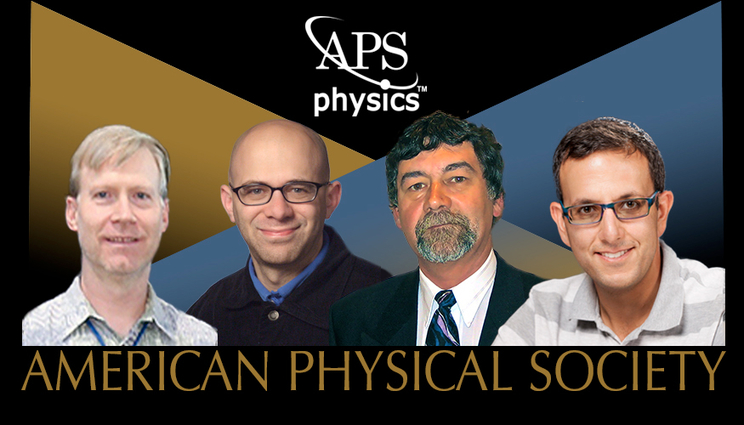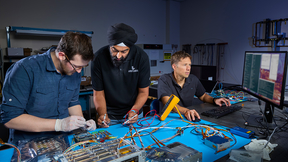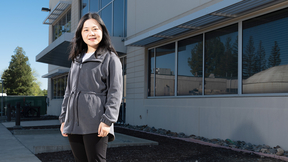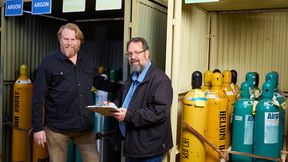Four Lawrence Livermore National Lab researchers selected as 2016 APS Fellows
 (Download Image)
Lawrence Livermore researchers (from left) Adam Bernstein, Omar Hurricane, Hui Chen and James Trebes have been selected as 2016 fellows of the American Physical Society.
(Download Image)
Lawrence Livermore researchers (from left) Adam Bernstein, Omar Hurricane, Hui Chen and James Trebes have been selected as 2016 fellows of the American Physical Society.
LIVERMORE, California – Four Lawrence Livermore National Laboratory (LLNL) scientists have been selected as 2016 fellows of the American Physical Society (APS).
Election to APS fellowship recognizes the society member’s exceptional contributions to the field of physics through research, leadership, applications of physics or contributions to physics education. APS fellowship is considered a distinct honor because members are nominated and elected by their peers.
Physicist Adam Bernstein was cited by the Division of Nuclear Physics for "pioneering work at the intersection of nuclear science and nuclear nonproliferation, including the development of antineutrino-based methods for monitoring the production of fissile material and large volume detectors for rapid screening of cargo for the presence of fissile material."
Bernstein joined LLNL as a staff physicist in 2002 and now leads the Rare Event Detection Group. He helped pioneer and advance a now broad and international effort to develop antineutrino detectors as a tool for monitoring plutonium production in nuclear reactors. Bernstein's research interests include the development of improved radiation detection techniques that facilitate global nuclear arms and materials control, nonproliferation and disarmament, the study of the elusive and mysterious neutrino and the search for direct interactions of dark matter in earthly detectors. He received his bachelor’s degree in physics from UC Berkeley and Ph.D. in experimental high energy physics from Columbia University.
"I’m happy that the physics community sees the scientific value in the applications of fundamental particle physics to practical aims in nonproliferation and global control of nuclear materials," Bernstein said. "Thanks to the deep enthusiasm and knowledge of my coworkers and the willingness of the institution to support long-term and speculative research, I’ve found LLNL to be a great environment for the development of concepts that are at once intellectually stimulating and socially relevant."
The Division of Plasma Physics recognized physicist Hui Chen for "pioneering experimental research on relativistic positron generation using ultra-intense short-pulse lasers."
Chen joined LLNL in 1999 as a postdoc after completing her Ph.D. in plasma physics at Imperial College in London and a bachelor’s degree in physics at Chengdu University of Science and Technology in China. Chen has been active in several lines of plasma physics research at LLNL, including laser-produced matter/antimatter plasmas, X-ray spectroscopy of highly charged ions, innovative instrumentation and fundamental short-pulse laser-plasma physics. The work cited for the APS fellowship is her trailblazing decade-long experimental study of laser-produced relativistic electron-positron plasma "jets," using five larger laser facilities on three continents.
"I am fortunate and grateful to have great opportunities to work with world-class colleagues and students at LLNL and collaborating institutions, to have the best laser facilities to experiment on and to have LDRD support. Without any of these, we would not have gotten those exciting results. Now we look forward to our next challenge: learning how to making electron-positron jets on NIF," Chen said.
Omar Hurricane, chief scientist of the Inertial Confinement Fusion (ICF) Program and lead of integrated experiments, was cited by the Division of Plasma Physics for "visionary leadership in experiments on the National Ignition Facility (NIF) laser and innovative work in understanding instabilities in high energy density and inertial confinement fusion plasmas leading to the first laboratory demonstration of an alpha-heating-dominated, thermonuclear plasma producing a fusion energy exceeding its total stored energy."
After completing graduate and postdoc studies in plasma stability theory at UCLA, Hurricane joined LLNL in secondary design. He developed models that formed the guiding framework for research focused upon resolving the "energy balance problem" for which he was awarded the 2009 E.O. Lawrence Award for his contribution and scientific leadership. In the early 2000s, he was lead secondary designer for the W87 during its life extension program (LEP), was later a load designer for LLNL’s Phoenix pulse-power experiments and enjoyed designing high-energy-density (HED) experiments on the side. Since 2012, Hurricane has led the effort to try and unravel the complexities of ignition at NIF.
"I like trying to crack hard problems. and trying to get fusion ignition using such a small amount of applied energy is a whopper of a hard problem. So making some forward progress by applying a step-by-step systematic approach obtaining ‘fuel gain’ and significant alpha-heating, with a team of fun and hard-working colleagues, was very gratifying," Hurricane said. "I am very grateful to my colleagues and past mentors for their efforts in nominating me for this special honor."
The Forum on Physics and Society acknowledged James Trebes, the Physical and Life Sciences Directorate's Physics Division leader, for "contributions in laser physics and the application of physics to other disciplines, for leadership in multiple national security areas, and for contributions to education in the sciences and engineering."
Trebes joined the Laboratory in 1984. He has worked in a broad range of research and development areas including X-ray lasers, ICF, weapons physics, X-ray optics, detectors, nonproliferation projects in Russia and Libya, military special operations technology, medical technology, biodetection, enhanced surveillance and space technology. He received his bachelor’s degree in physics from Georgia Tech and his Ph.D in physics from Yale University.
"It is really fantastic being recognized by your peers for all the work you have done over the years," Trebes said.
In the past 30 years, more than 100 LLNL employees have been elected APS fellows.
APS fellowships are awarded after an extensive evaluation process conducted by the fellowship committees of individual divisions, topical groups and forums. Election to APS fellowship is limited to no more than one half of 1 percent of APS' membership for a given year.
Contact
Kate Hunts[email protected]
925-422-1322
Related Links
American Physical SocietyTags
American Physical SocietyPhysical and Life Sciences
Careers
Featured Articles







